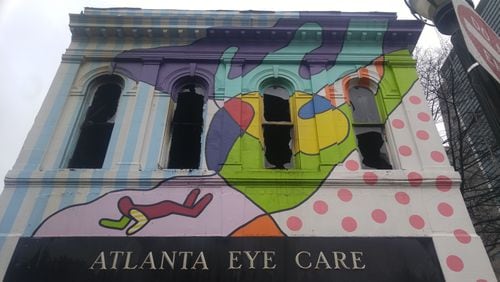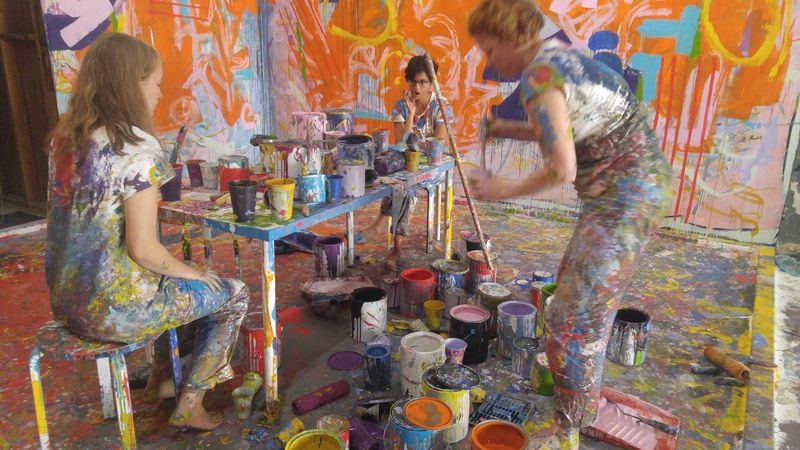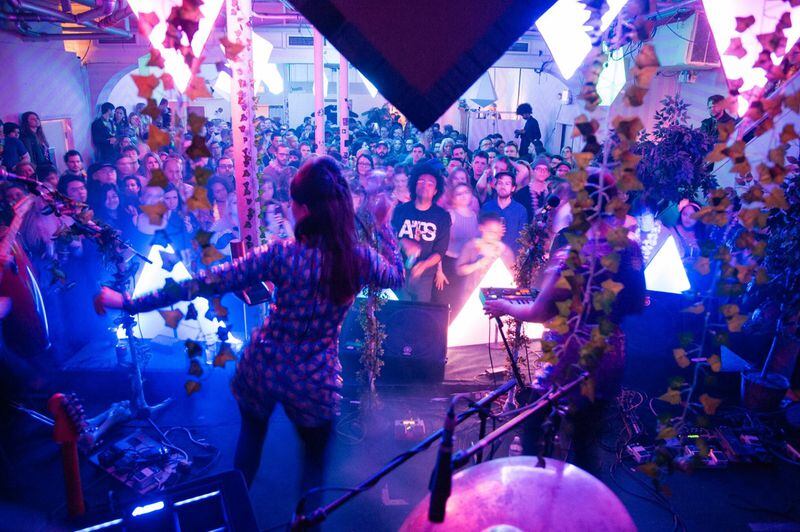One of the most enduring and resilient independent Atlanta art institutions, the non-profit gallery and performance space Eyedrum Art and Music, has survived the kind of trials that would sink lesser organizations.
It has weathered recessions; Atlanta’s rapid gentrification; three location changes; personnel flux and just about everything else fate can dish out. For 20 years the peripatetic arts venue has served up gallery exhibitions, experimental music, films, lectures and a remarkable array of creative pursuits.
But through it all, the enduring vision of the late Atlanta painter Woody Cornwell, who founded Eyedrum in 1998, has survived at the longest-running volunteer-run avant-garde venue in the city.
In 2014 Eyedrum signed a seven-year lease on its current space at 88 Forsyth Street. In a 100-year-old building in the heart of Atlanta's South Downtown neighborhood — the area between Marietta and Decatur Streets and east of Castleberry Hill — Eyedrum was helping anchor a growing artistic community.
But on Feb. 4, Eyedrum experienced yet another trial, this one literally by fire. An early morning blaze on the second floor of a nearby building killed a homeless man and put into flux the future of a number of galleries in the area, including Eyedrum.
“The day after the Broad Street fire at the Atlanta Eye Care building, city officials requested a safety inspection of all the adjoining buildings,” says Eyedrum’s board of directors vice-chair Grace Kim. “Though Eyedrum sustained no damage from the fire, it was included in this inspection and has since been closed until further notice.” The organization needs to obtain a certificate of occupancy before it can reopen.
Other arts organizations affected by that temporary closure include the DIY resource center and exhibition space Murmur, the independent Mammal Gallery and the Broad Street Visitors Center recording studio. The buildings that house those arts spaces, as well as Eyedrum and dozens of other buildings in South Downtown, had been purchased in recent years by the German-based development firm Newport Holding. Jake Nawrocki, president of Newport US RE, assured the Atlanta Journal-Constitution in June 2017 that his company was investing in the area with the intent of refurbishing the buildings and cultivating a mix of office, retail, gallery, restaurant and apartment space in the area.
“We are absolutely not planning to buy and flip,” he said.
For now, many are just hoping Eyedrum can rebound and continue to offer audiences its characteristic mix of experimentation and innovation in a section of Atlanta where corporate growth and indie creativity seemed to have temporarily struck a balance.
“These South Downtown organizations serve as a gravity center and the pulse of the DIY Atlanta arts scene,” says Goat Farm Arts Center’s Allie Bashuk. “People are moving to Atlanta just to be a part of this community because these places are accessible and alive.”
For now the temporary closure of the buildings that house the art spaces have left staff and volunteers scrambling for new locations to host already scheduled events and performances. And the fire has made many wonder whether this revitalizing neighborhood and burgeoning arts district can weather the setback.
“As an individual artist with a deep interest in the area and who cares about all the players there, I’m worried,” says former Eyedrum executive director Priscilla Smith. “We all want to be safe and maintain spaces that are safe for our participants. Newport is a developer whose interest must be economic. They’re there to make money. They will use artists to support their economic interests as long as it works to their advantage.”
But others have been heartened by Newport Holding’s response.
“Newport has been very accommodating to our artists, finding event space while the city conducts the necessary safety inspections,” says board member Tracy Woodard.
Yet in terms of making the improvements Eyedrum needs to get the space up to code, much remains ambiguous, says a long-time Eyedrum board member and treasurer, Neil Fried.
“We are hoping that Newport invests in our property now to get certain things up to code. It’s a negotiation. We think Eyedrum can be an anchor in the community and hope they understand that,” he says.
Despite the tragic death and momentary setbacks, Mammal Gallery founder and co-owner Brian Egan thinks the fire might yield some advantages for the South Downtown arts district. Improving the spaces could turn out to have positive results for the area long term, he says.
“The more that organizations like Murmur, Eyedrum and Mammal can focus on putting together programming, and less about the state the buildings are in, the more that art will flourish in South Downtown,” he says.
For Fried the fire has served as a catalyst of sorts. “It forces everyone to make decisions.”
At a post-fire town hall meeting held at the Atlanta Contemporary on Feb. 17, one of those decisions, says Fried, has been the necessity of finding new leadership for Eyedrum since the exit of executive director Priscilla Smith in 2016. “We know that, and are pursuing that. We have a two-year plan that includes an executive director, and we need about 120k to do that properly.”
For now, Eyedrum organizers, with the help of the Atlanta creative community, are working to find alternative venues for their exhibitions and performances until their building can be brought up to code. Kim and Fried say some of the proposed venues have included the M. Rich Building, Railroad Earth, C4 Fuse Arts Center, The Goat Farm, Atlanta-Fulton Public Library and the Circus School of Atlanta.
“The challenge is finding the appropriate venue for the art or music, particularly if artwork was prepared for exhibition specifically with Eyedrum’s unique aspects in mind,” says Kim.
For her part, Kim sees the possibilities ahead. Despite some fears that the city’s rapid development in places like South Downtown will push out the arts organizations that helped bring attention to the area, she says, “We give Atlantans an opportunity to discover their identity through the arts. We can change people’s minds about what is good and what is possible and what Atlanta could be.”
About the Author








